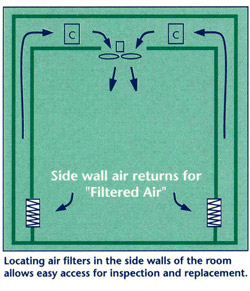Particulate
 In
cold storage rooms, particulate is not generally a concern. Environmental
rooms, in contrast, often contain operations which are sensitive to excessive
particulate.
In
cold storage rooms, particulate is not generally a concern. Environmental
rooms, in contrast, often contain operations which are sensitive to excessive
particulate.
However, environmental rooms are not usually constructed to clean room standards. Clean rooms are specified in terms of the maximum number of particles of a certain size permitted in a given volume of air. The maximums are called “classes”. For example, a Class 10,000 clean room can have a maximum of 10,000 particles with an average diameter of .05 microns and larger in each cubic foot of air.
 Most operations contained in environmental rooms are not sensitive enough
to warrant specifying a clean room class. If the requirement is that critical,
the
architect should consult with the room manufacturer, because other variables
become more important, and the cost of the room is likely to increase by 30%
or more.
Most operations contained in environmental rooms are not sensitive enough
to warrant specifying a clean room class. If the requirement is that critical,
the
architect should consult with the room manufacturer, because other variables
become more important, and the cost of the room is likely to increase by 30%
or more.
More commonly, there is simply a need to limit particulate to lower than normal ambient concentrations of several million particles per cubic foot.
Two levels are typically specified for environmental rooms:
Filtered air
At this level, the room manufacturer changes the air distribution system,
installing return-air plenum walls rather than returning air to the center
of the ceiling.
Rough filters--ASHRAE 35%--are installed at the return air grilles in the side
walls. These changes add approximately 10% to the cost of the room.
HEPA-filtered air
HEPA means High Efficiency Particle Arrestor, and such filters remove a minimum
of 99% of the particles larger than five microns. (Some HEPA filters remove up
to 99.9997% of such particles) When the architect specifies HEPA-filtered air,
the room manufacturer will install “fan-filter modules” in the room
ceiling. Specifying HEPA-filtered air will add an additional 10% to a “filtered
air” room cost, and often achieves clean room class 100,000 standards.
| Environmental
Rooms | Dry
Rooms | Clean
Rooms | Archival
Storage Vaults | |
Harris Environmental Systems, Inc. • 11 Connector Road • Andover, MA 01810 |
| tel: (978) 470-8600 • fax: (978) 475-7903 |